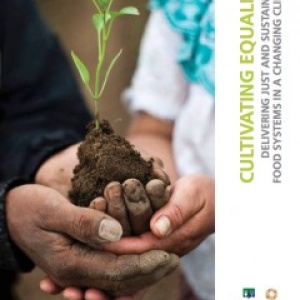
In advance of the World Food Day CARE, Food Tank, and CCAFS have released the report Cultivating Equality: Delivering Just and Sustainable Food Systems in a Changing Climate. The report focuses on the need to tackle inequity and gender inequality to end hunger and malnutrition in the face of climate change.
Inequality determines who eats first and who eats worst, and this shapes people’s ability to adapt to climate change. Solutions around food production are not enough, and inequality in food systems also needs to be addressed. The report states that: “Business as usual—increasing greenhouse gas emissions, unsustainable means of production, high levels of food waste and loss, and unequal access to resources and power—is unacceptable. It’s time for a dialogue—and action—about equity.”
To realise food and nutrition security for all in the face of climate change, the report authors make the following recommendations to governments, the private sector, donors, and individuals:
- Prioritise women’s empowerment and integrate climate change in all approaches to food and nutrition security;
- Ensure small-scale food producers and women have a seat at the table when policies and budgets are decided;
- Commit to ambitious action to tackle the climate crisis and keep global temperatures below 1.5 degrees Celsius;
- Commit to scaling up of finance to address hunger and climate change;
- Respect the rights of small-scale food producers and women and commit to equitable approaches in policies and supply chains;
- Know where your food comes from to make sustainable consumption choices.
Read the full report here. You can also download a two-page summary and key recommendations.
You can see further resources related to this topic in the research library categories on inequality, development/poverty, food and poverty, climate change impacts and adaptation, governance and policy, sustainable development goals and sustainable food security. See also the related category on socio-economic determinants of health.







Post a new comment »